Uniden WDECT3355 User Manual

WDECT3355
WDECT3355+1
WDECT3355+2
Series Owner’s Manual
OWNER’S MANUAL
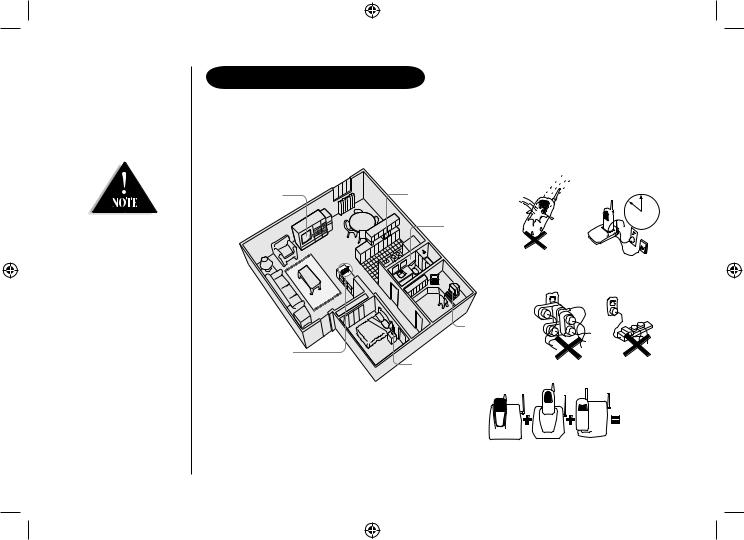
•This symbol indicates important operating and servicing instructions.
•The earcap of this telephone may attract and retain small metallic objects.
installation & safety
Choosing the best location for your phone.
When choosing a location for your phone there are a number of appliances the phone should not be near, and areas you should avoid.
AVOID - Television sets and other electronic appliances
CHOOSE -
a central location
AVOID -
Moisture
AVOID -
Microwave ovens
AVOID - moisture
Don’t - overload the power outlet.
AVOID -
Computers
AVOID -
other cordless telephones
Note: Ringing will not be impaired by adding extra cordless handsets. For detailed installing method, please refer Set-Up Guide.
CHARGE - the new phone for 15 - 20 hrs.
AVOID -
multi power boards.
AVOID - connecting
more than
3
phones as ringing may be impaired
[ i ]
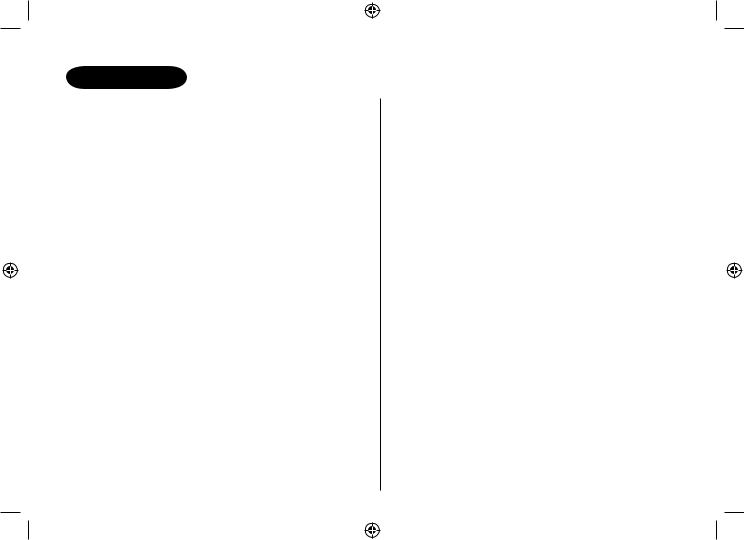
Contents
installation & safety |
i |
Contents |
ii |
Controls and Functions |
1 |
Welcome |
3 |
Features |
3 |
Terminology |
4 |
Mounting the Base Unit on a Wall |
5 |
Battery Maintenance |
6 |
Installing the Beltclip |
7 |
Headset Installation |
8 |
Display and Icons |
8 |
About the Menu Options |
9 |
Setting up the Menu |
13 |
Basics |
21 |
Making and Receiving Calls |
21 |
Keypad Lock |
22 |
Placing a Call on Hold |
22 |
Redialing a Call |
23 |
Adjusting the Handset Ringer, |
|
Earpiece and Speaker Volume |
24 |
Do Not Disturb (DND) |
25 |
Mute Microphone |
25 |
Tone Dialing Switch-Over (Australia Only) |
26 |
Traveling Out-of-Range |
26 |
Clarity Booster |
26 |
Privacy Mode |
27 |
3-way Conferencing |
27 |
Find Handset |
28 |
Flash and Call Waiting |
28 |
New Message LED |
28 |
Phonebook |
29 |
Phonebook |
29 |
Storing Phone Numbers, Names, |
|
Distinctive Rings, and Speed Dial |
29 |
Steps for Entering Names and Special Characters 31
Viewing the Phonebook |
33 |
Making Calls Using the Phonebook |
34 |
Speed Dialing |
34 |
Editing or Erasing a Stored Name, |
|
Phone Number, Distinctive Ring, and Speed Dial 35 |
|
Chain Dialing |
36 |
Memory Dialing (Base Only) |
36 |
Caller ID |
37 |
Caller ID |
37 |
Viewing the Caller ID List |
38 |
Deleting a Caller ID Message |
39 |
Using the Caller ID Message List |
40 |
the INTEGRATED ANSWERING DEVICE |
41 |
The Integrated Answering Device |
41 |
Turning the Answering System On/Off |
42 |
Setting up your Answering System |
43 |
Using your Answering System |
49 |
Remote Operation |
52 |
Expanding your phone |
55 |
Expanding your Phone |
55 |
Register the Handset |
56 |
Using Two Way Communication between the |
|
Handsets Anywhere without the Base (DirectLink)57 |
|
Room Monitor |
57 |
4-Way Conferencing |
58 |
Intercom/Call Transfer Feature |
58 |
Replacing the Base |
59 |
Additional Information |
60 |
Changing the Digital Security Code |
60 |
Note on Power Sources |
61 |
Troubleshooting |
62 |
INDEX |
65 |
Warranty |
68 |
[ ii ]
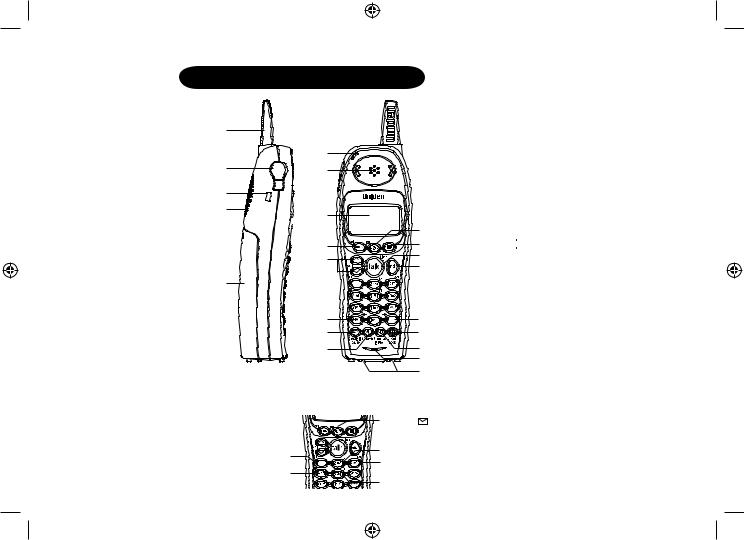
STARTED GETTING
Controls and Functions
1 |
|
|
|
6 |
|
2 |
7 |
|
3 |
|
|
4 |
8 |
|
|
|
|
|
|
14 |
|
9 |
15 |
|
16 |
|
|
10 |
|
|
17 |
|
5 |
|
|
|
11 |
18 |
|
12 |
19 |
|
13 |
20 |
|
|
21 |
|
|
22 |
Handset Remote Operation (P. 53) (Review ITAD messages from handset)
|
Select/ Key |
|
Repeat Key |
Play Key |
|
Skip Key |
||
|
||
Delete Key |
Stop Key |
|
|
1.Handset Antenna
2.Headset Jack Cover
3.Beltclip Hole
4.Hands-Free Speaker
5.Handset Battery Compartment
6.New Message LED
7.Handset Earpiece
8.LCD Display
9. /del Key
/del Key
10. /vol/
/vol/ /
/ Key
Key
a.ringer volume control
b.scroll keys for display screen
11. tone
tone Key
Key
12. redial/pause Key
redial/pause Key
13. speaker Key
speaker Key
14.
 Key
Key
15. Key
Key
16.


 Key
Key
17. Key
Key
18.

 Key
Key
19. phonebook Key
phonebook Key
20. /transfer/int’com Key
/transfer/int’com Key
21.Handset Microphone
22.Handset Charging Contacts
[ ]
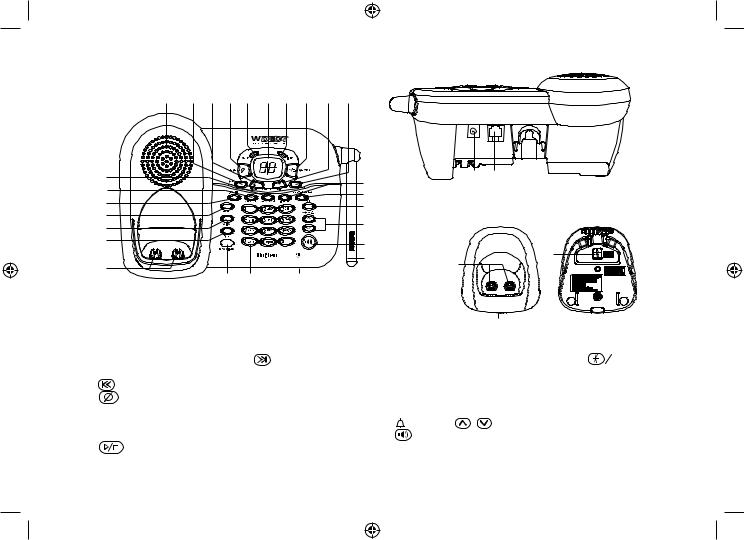
Main Base
23 24 25 26 27 28 29 30 31 32
33
34
35
36
37
38
39
46 |
47 |
48 |
40
41
42
43
44
45
49 50
CHARGER BASE
for +1, +2 models only
53
51
52
23. |
Base Speaker |
31. |
skip/SELECT |
38. |
Flash Key |
|
|
47. |
tone Key |
24. |
Clock/MENU Key |
|
Key |
39. |
Base Charging Contacts |
48. |
Microphone |
||
25. |
repeat/SELECT Key |
32. |
SET Key |
40. |
Intercom Key |
|
|
49. |
DC IN 9V Jack |
26. |
delete Key |
33. |
Memo record Key |
41. |
Mute/find handset Key |
50. |
TEL LINE Jack |
||
27. |
Charge LED |
34. |
Ans on/off Key |
42. |
Hold Key |
|
|
51. |
Charging Contacts |
28. |
Message Counter Display |
35. |
Greeting Key |
43. |
/volume |
/ |
Key |
52. |
Charge LED |
29. |
In use LED |
36. |
Mem Key |
44. |
Key/speaker LED |
53. |
DC IN 9V Jack |
||
30. |
play/stop Key |
37. |
Redial/pause Key |
45. |
Base Antenna |
|
|
|
|
|
|
|
|
46. |
Do not disturb Key/DND LED |
|
|
||
[ ]
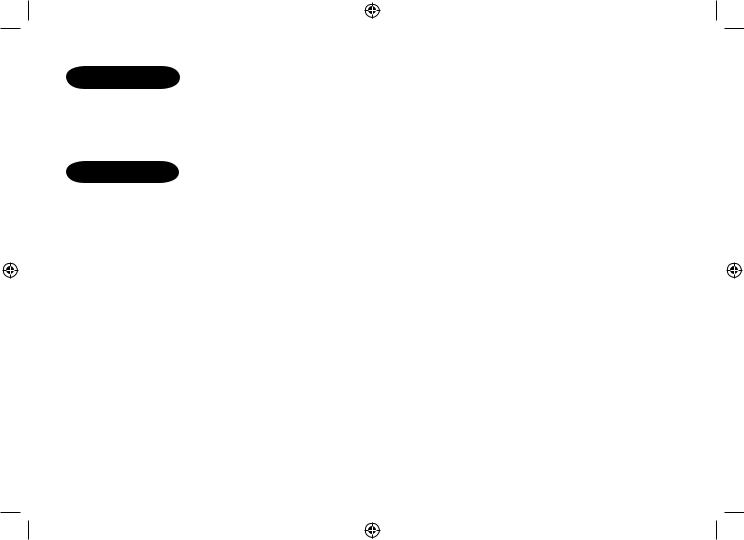
Welcome
Congratulations on your purchase of the Uniden Multi-Handset Cordless System telephone. This unit is different from conventional cordless telephones. When the base unit is connected to AC power and a telephone line, it can support up to 4 handsets. Using extra handsets, you can establish a 3-way conference call (2 handsets and an outside line), while two other handsets are making an intercom call. You can now place a fully featured cordless handset anywhere in your home or office where AC power is available to connect the handset chargers.
Note: The illustrations in this manual are intended as a guide and may differ from actual unit.
features
Great features of this cordless phone include:
•Designed and Engineered in Japan
•Wide Band Digital Technology
•Multi (4) Handset Capable
•Digital Duplex Speakerphone on Handset
Advanced Alpha Display Caller ID Features:
•Alpha Memory Dialing
•POP ID - Caller Name Identification*
•20 Individual Caller Tone Allocation*
•100 Caller ID * Memories with Phonebook
•3 Line Backlit Full Dot Matrix LCD Display with Clock
•Maxi-Sound - Extra Loud Handset Volume Control
•Intercom/Announce Call Transfer
•Handset Conferencing (2 Handsets + Outside Call)
•Two-Way Communication between Handsets Anywhere without the Base
•Dual Keypad at Base
•Integrated Answering Device
•DND Feature (Do Not Disturb)
•Remote Message Retrieval
•Personal or Factory Pre-recorded Greeting Message
•And More!
*Caller ID, POP ID and Individual Caller Tone Allocation (Distinctive Ring) features work only if you subscribe to the service provided by your local telephone company. There is usually a fee for this service.
# Range may vary depending on environmental and/or topographical conditions.
[ ]

Terminology
Throughout this manual, terms such as Standby and Talk Mode are used. Below is the terminology explanation.
Standby Mode - The handset is not in use, is off the cradle, and |
|
or |
speaker, or |
has not |
|||
|
|||||||
been pressed. A dial tone is not present. |
|
speaker, or |
|
|
|||
Talk Mode - The handset is not in the cradle and |
|
|
or |
has been pressed |
|||
|
|||||||
enabling a dial tone. “Talk” appears on the handset display. |
|
|
|
|
|
||
DirectLink - Two way communication between the handsets anywhere without the base.
[ ]
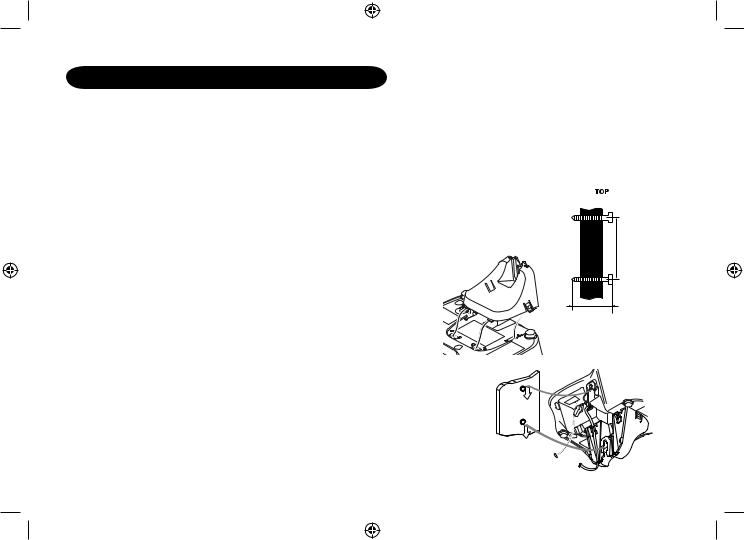
Mounting the base unit on a wall
You can mount your base directly to the wall. Before doing this, consider the following:
•Avoid electrical cables, pipes, or other items behind the mounting location that could cause a hazard when inserting screws into the wall.
•Mount your phone within distance of a working phone jack.
•Make sure the wall material is capable of supporting the weight of the base and handset.
•Use screws with anchoring devices suitable for the wall material where the base unit will be placed.
1)Insert two mounting screws into the wall (with their appropriate anchoring device), 100mm apart. Allow about 3mm between the wall and screwheads for mounting
the phone.
Attaching wall mount adapter and Routing the telephone cord
2)Snap the wall mount adapter into the notches on the base top.
3)Plug the AC adapter into the DC IN 9V jack on the telephone and then into a Standard AC wall outlet.
4)Plug the telephone cord into the TEL LINE jack on the telephone and route the cord through the molded wiring channel. Then plug into the telephone socket on the wall.
5)Raise the antenna to a vertical position.
6)Align the mounting slots on the base with the mounting posts on the wall.
7)Then push in and down until the phone is firmly seated.
This phone also can be mounted on any standard telephone wall plate (for Australia).
 3mm
3mm
100mm
35mm |
[ ]
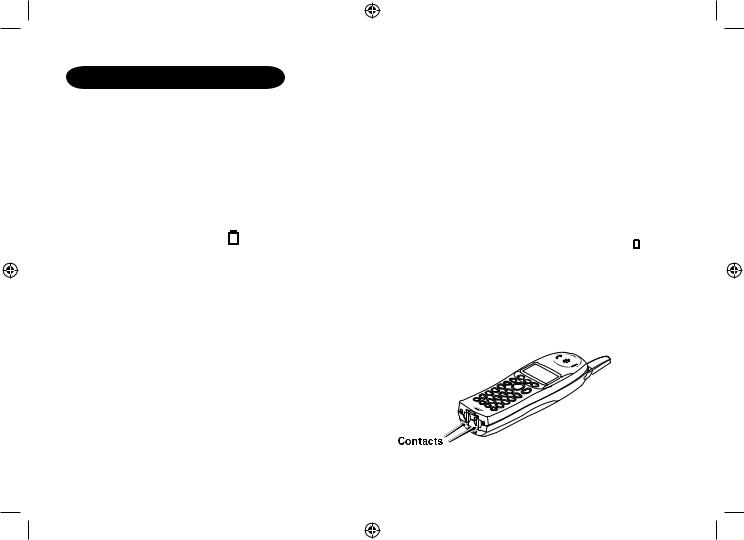
battery maintenance
Battery use time (per charge)
Fully charged
•Up to 7 hours continuous use
•Up to 10 days when the handset is in the standby mode (up to 15 hours when in DirectLink mode) Recharge your phone on a regular basis by returning the handset to the charger after each phone call.
Low battery alert
When the batteries are very low and need to be charged, the phone is programmed to eliminate functions in order to save power.
The batteries need to be charged when:
- The empty battery icon |
|
appears. |
Low Battery |
|
|||
- “Low Battery” appears in the display. |
|||
If the phone is in the standby mode, none of keys will operate. If you are |
|
||
on a call, complete your conversation as quickly as possible, and return |
|
||
the handset to the cradle. |
|
|
|
Cleaning the battery charging contacts
To maintain a good charge, it is important to clean the charging contacts on the handset once a month. Use a dry cloth or pencil eraser to clean.
[ ]
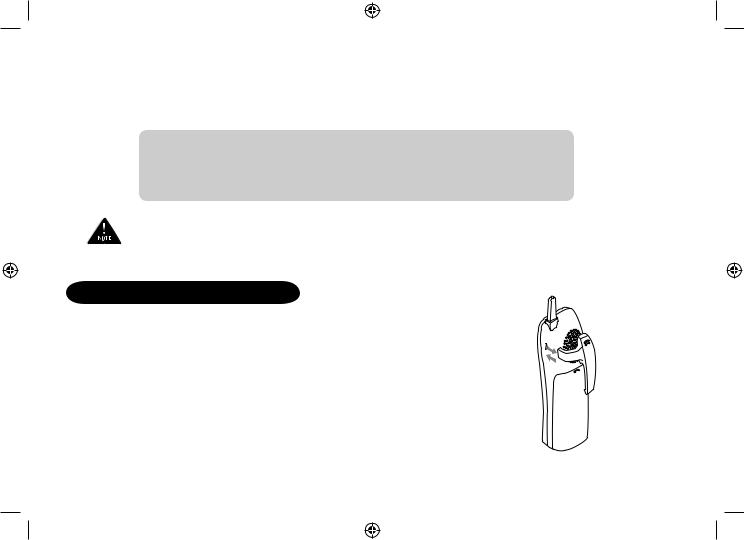
Battery replacement and handling
When the operating time becomes short, even after a battery is recharged, please replace the battery. With normal usage, your battery should last about one year. Please contact your place of purchase or the Uniden Parts Department for a replacement battery.
Caution
•Use only the specified Uniden battery pack (BT-446).
•Do not remove the batteries from the handset to charge them.
•Never throw the battery into a fire, disassemble them, or heat them.
•Do not remove or damage the battery casing.
To avoid the risk of personal injury or property damage from fire or electrical shock, only use the Uniden battery model and Uniden adapter model specifically designated for this product.
Installing the Beltclip
To attach the beltclip
Insert the beltclip into the holes on each side of the handset. Press down until it clicks into place.
To remove the beltclip
Pull either side of the beltclip to release the tabs from the holes.
[ ]
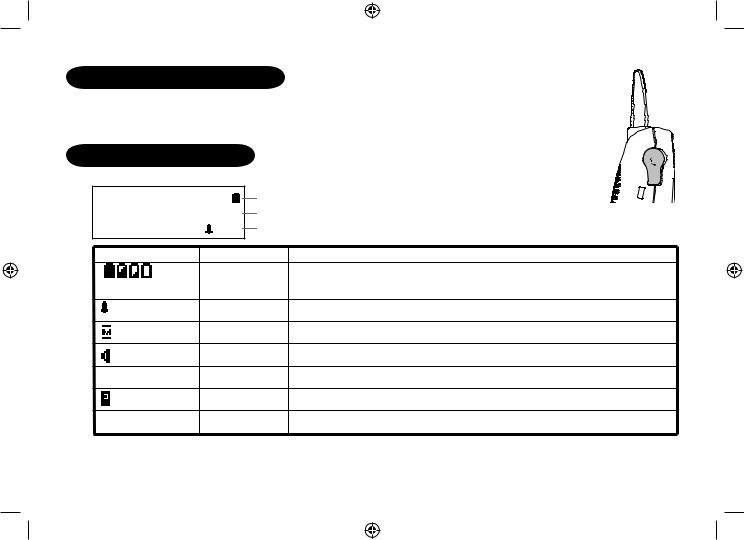
Headset Installation
Your phone may be used with an optional headset, the Uniden HS910. To use this feature, insert the headset plug into the headset jack. Your phone is ready for hands-free conversations. Headset is available through Uniden authorized retailers.
Display and Icons
Example of the standby mode display
SUN 12:00A |
Day of the week and time / battery icon |
|
Handset #1 |
Handset ID and Banner |
|
New: 5 |
:OFF Number of new Caller ID calls received / Ringer off icon (when the ringer is Off) |
|
ICON |
STATUS |
DESCRIPTION |
Standby/Talk |
Battery icon indicates the handset battery status. This icon cycles |
|
depending on the battery status (full, medium, low, and empty). |
||
:OFF |
Standby |
Ringer off icon indicates that ringer is turned off. |
|
Talk |
Mute icon appears when you mute the handset. |
|
Talk |
Speaker icon appears when the handset speaker phone is used. |
B |
Talk |
Booster icon appears when the Clarity Booster feature is in use. |
|
Talk |
Privacy icon appears when the Privacy Mode is turned on. |
R |
Talk |
Recording icon appears while recording a conversation. |
[ ]

During Global Setup and System Reset, make sure your cordless phone is in standby mode (not in use), and all handsets are within range of the main base unit.
About the Menu options
There are 6 main menu options, (DirectLink Mode, Room Monitor, Handset Setup, Answ. Setup, Global Setup and System Reset) and submenu options.
Summary of the Main Menu and Submenu
Two Way Communication between the Handsets Anywhere without the Base (DirectLink)
DirectLink Mode allows a pair of handsets to work without the base unit, for direct handset-to-handset communication. Use them at sporting events or while shopping to stay in contact with family members or friends. You must set the two handsets to DirectLink Mode to utilize this feature.
Room Monitor
This feature allows you to monitor sounds in another room (see page 14 for setup). One handset (or the base) is placed in the desired room to monitor (acts as remote mic), and the other is placed near listener (remote speaker). This is useful for monitoring child activities.
[ ]
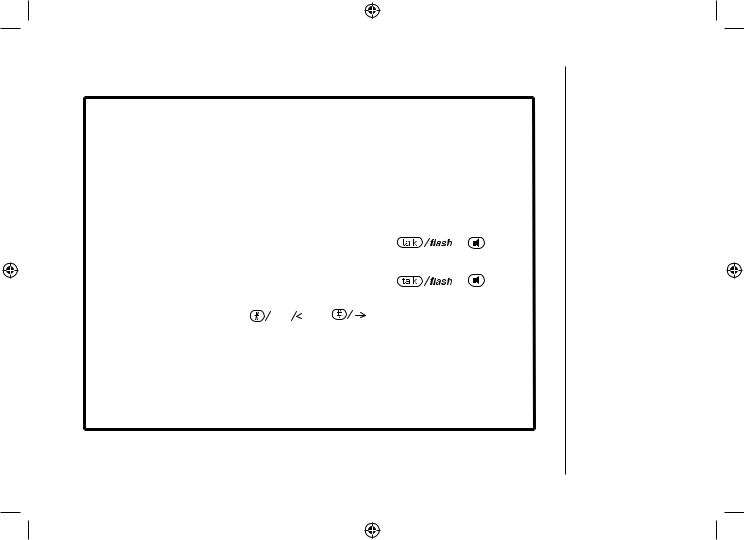
Handset Setup
The following submenu options must be set separately for each handset.
Submenu name |
|
|
|
Description |
|
|
|||||
Ringer Tones |
Adjusting the ringer tone (tone your phone makes when ringing) |
|
|||||||||
(Default is Flicker) |
(see page 15). |
|
|
|
|
|
|
|
|
|
|
|
|
|
|
|
|
|
|
||||
|
Set the distinctive ring (see page 15). “Distinctive Ring” allows you to |
|
|||||||||
|
preset memory locations with a designated ring tone. When an incoming call |
||||||||||
|
is received and the Caller ID information matches the information in one of |
||||||||||
Distinct. Ring |
the memory locations, the distinctive ring that has been stored for that |
||||||||||
(Default is on) |
particular Caller will sound. If you have set multiple memory locations with |
||||||||||
|
distinctive rings, switching the setting to “Distinctive Off” will result in no |
||||||||||
|
distinctive ringing. All incoming calls will have a normal ring tone. Switching to |
||||||||||
|
“Distinctive On” will activate all programmed distinctive ring memory locations. |
||||||||||
|
|
|
|
|
|
|
|
|
|||
AutoTalk |
Allows you to answer the phone without pressing |
|
|
|
or |
speaker. |
|||||
|
|
||||||||||
(Default is on) |
When the AutoTalk is set to on, simply remove the handset from the cradle |
||||||||||
|
and the phone automatically answers the call (see page 15). |
|
|
||||||||
|
|
|
|
|
|
|
|
|
|||
Anykey Answer |
Allows you to answer the phone without pressing |
|
|
or |
|
||||||
|
|
||||||||||
|
speaker. |
|
|
|
|
|
|
|
|
|
|
|
When the Anykey Answer is on, you can answer a call by pressing any |
||||||||||
(Default is on) |
number key, |
tone |
|
, or |
on the handset (see page 16). |
||||||
|
|||||||||||
Banner (True Banner) |
Customize your handset(s) by giving it a banner name. The name will be |
||||||||||
|
displayed on the LCD screen during standby mode, Intercom, Transfer, Room |
||||||||||
|
Monitor and Copy Phonebook operation. The banner name will be displayed |
||||||||||
|
on the receiving handset as well (see page 16). |
|
|
||||||||
|
|
|
|
|
|
|
|||||
Key Touch Tone |
Allows you to set your phone’s key touch-tone to on or off (tone your keypad |
||||||||||
(Default is on) |
makes when keys are pressed) (see page 16). |
|
|
||||||||
|
|
|
|
|
|
|
|
|
|
|
|
[ 10 ]
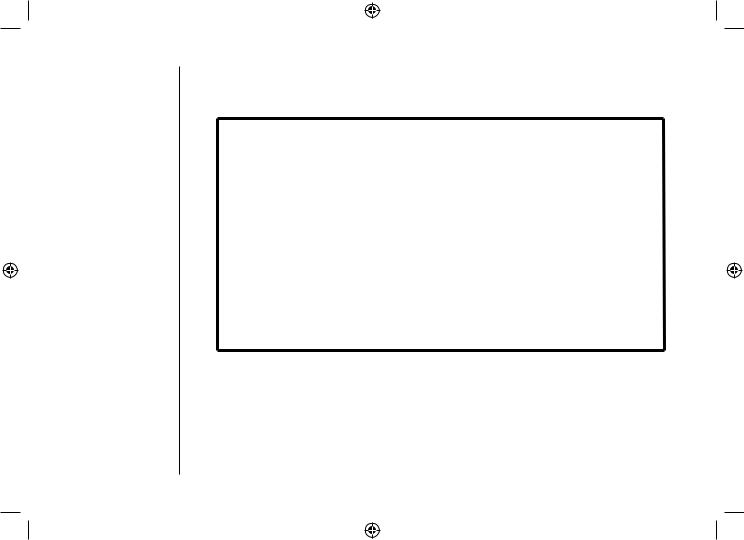
Answering Setup
This main menu option allows you to set up TAD settings from your handset. You can also set these submenu options from the base (see page 44).
Submenu name |
Description |
|
Security Code |
Select a two-digit Personal Identification Number (PIN) code. A PIN code is |
|
(Default is 80) |
required to play your messages from a remote location, you will need to enter |
|
|
a two-digit PIN code (see page 16). |
|
|
|
|
Ring Time |
Allows you to set the number of rings the caller hears before your answering |
|
(Default is 9 time) |
system plays the outgoing message. You can set the ring time to answer after |
|
|
four, six, or nine rings. Setting “TS” (Toll Saver), the answering system picks |
|
|
up after six rings if you have new messages, and after nine rings if there are |
|
|
none (see page 17). |
|
|
|
|
Record Time |
Set the duration for recording the incoming messages. You have three record |
|
(Default is 1 minute) |
time options. The options “1 minute” or “4 minutes” set the duration for |
|
|
recording the incoming messages. “Announce only” answers the call with the |
|
|
preset greeting or your personal greeting but prevents the caller from leaving |
|
|
a message (see page 17). |
|
|
|
|
Message Alert |
Lets you know when you have a new incoming message by sounding a short |
|
(Default is off) |
alert tone (see page 17). |
|
|
|
|
Call Screen |
Allows you to screen an incoming call before answering the call. Set the call- |
|
(Default is on) |
screening feature to on or off (see page 17). |
|
|
|
|
[ 11 ]
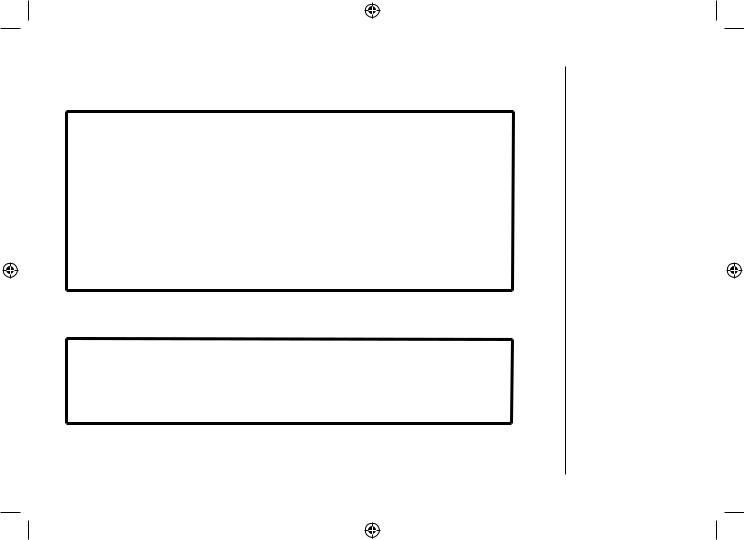
Global Setup
If you change one of the Global settings, you change the setting for all additional handsets. Only one handset can change Global settings at a time.
Submenu name |
Description |
|
Name Tag (POP ID) |
Display the stored name with the Caller ID telephone number, if the displayed |
|
(Default is on) |
Caller ID telephone number is exactly the same as a number stored in the |
|
|
phone book (see page 18). |
|
|
|
|
Insert 0 |
Add “0” or “00” to the number, when you receive the Caller ID message |
|
(New Zealand only) |
(see page 18). |
|
|
|
|
Day & time |
Set the day and time of your display (see page 18). |
|
|
|
|
Dial Mode |
Set the dial mode to tone or pulse (see page 19). Most phone systems use |
|
(Australia only) |
tone dialing, which send DTMF tone through phone line. The |
|
(Default is tone) |
default is tone dialing. |
|
|
Depends on your dialing system, set the dial mode. |
|
|
|
|
Copy Phonebook |
Allow you to transfer the phonebook data stored in one handset to another |
|
|
handset (see page 19). |
|
|
|
|
System Reset
System Reset is used to clear the handset’s ID from the main base unit, or the base ID from the handset.
Submenu name |
Description |
Deregister HS |
Clear the handset ID from the base. Use this option, for example, when you |
|
change the digital security code (see page 20). |
|
|
Replacing Base |
Clear the base ID. Use this option, for example, if you wish to deregister the |
|
base to use the handset with another base of the WDECT3315 and |
|
WDECT3355 series (see page 20). |
|
|
[ 12 ]
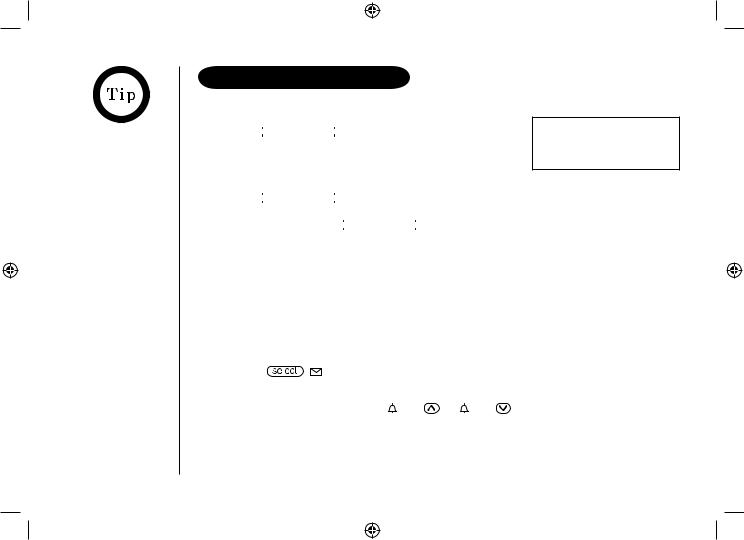
To go back to the previous screen, press  / del.
/ del.
[ 13 ]
Setting up the Menu
Entering the Menu
1)Press the  /del key in standby mode.
/del key in standby mode.
2)Use  /vol/
/vol/ or
or  /vol/
/vol/ to move the pointer to a desired main menu (DirectLink Mode, Room Monitor,
to move the pointer to a desired main menu (DirectLink Mode, Room Monitor,
Handset Setup, Answ. Setup, Global Setup, and System Reset).
 DirectLink Mode
DirectLink Mode
Room Monitor
Handset Setup
3)Press 
 to select the desired main menu.
to select the desired main menu.
4)Use  /vol/
/vol/ or
or  /vol/
/vol/ to select a desired submenu, and then press
to select a desired submenu, and then press 
 to enter.
to enter.
In the submenu, use  /vol/
/vol/ or
or  /vol/
/vol/ to select an item. Press
to select an item. Press 
 to confirm your selection. For detailed instructions, see the following sections for the desired submenu.
to confirm your selection. For detailed instructions, see the following sections for the desired submenu.
5)To exit the menu, press  or return the handset to the cradle.
or return the handset to the cradle.
DirectLink Mode
Entering the Two Way Communication between the Handsets Anywhere without the Base
1) Enter the DirectLink Mode menu (see “Entering the Menu” |
To enter |
||
above). To enter DirectLink mode press |
DirectLink mode |
||
[SELECT] appears. |
|
||
|
press [SELECT] |
||
2) Press |
|
to enter the DirectLink mode. You will |
|
|
|||
hear a confirmation tone, and DirectLink Mode Complete |
|
||
|
|||
appears. |
|
|
|
To adjust ringer volume, press /vol/ or /vol/ to select one of three ringer |
|||
volume (off, low, or high). |
|
||
3)To return back to the normal mode, exit the DirectLink mode. Press  /del, and then
/del, and then 
 , or return the handset to the cradle. DirectLink Mode Cancel appears.
, or return the handset to the cradle. DirectLink Mode Cancel appears.
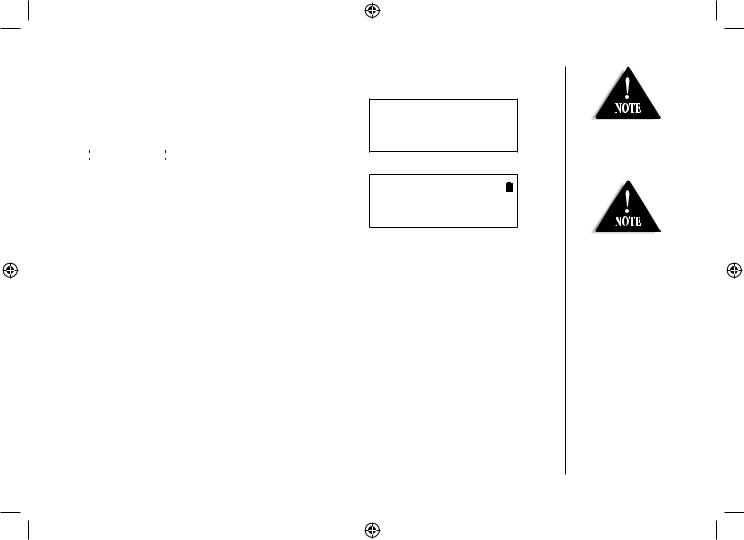
Room Monitor
Using Room Monitor
1)Enter the Room Monitor menu (see “Entering the Menu” on page 13).
To Room Monitor appears.
2)Select the handset you want to monitor by using
 /vol/
/vol/ or
or  /vol/
/vol/ .
.
3)Press 
 .
.
RoomMonitor appears, and you hear sounds in the room where the handset is installed.
4)To finish the Room Monitor, press  or return the handset to the cradle.
or return the handset to the cradle.
To Room Monitor
 Handset #2
Handset #2
Base
RoomMonitor 


 Handset #2
Handset #2
This is an example, if you have handset #1 and #2.
The Room/Baby monitor function is not a replacement for regularly checking the safety and security of children. The operating time
is limited to the remaining charge of the battery and is not suitable for continuous overnight use.
[ 14 ]
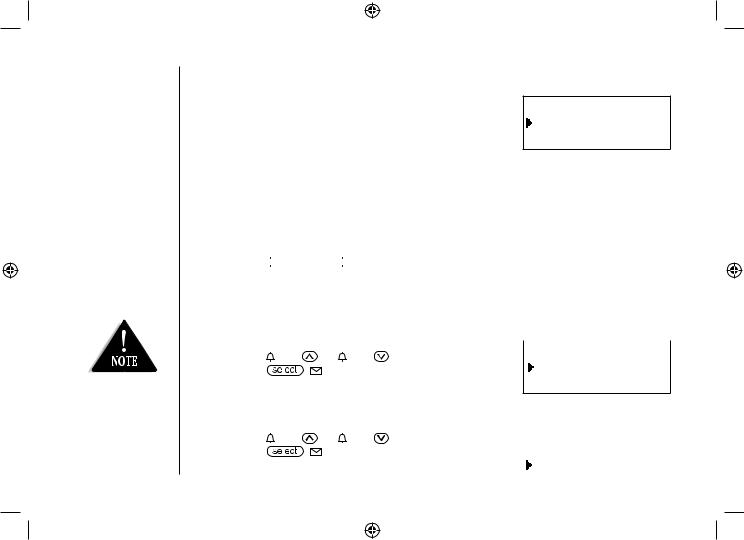
Distinctive ringing will only operate if you subscribe to the Caller ID service.
Handset Setup
Selecting a Ringer Tone
1) Enter the Handset Setup menu, and then the Ringer Tones submenu (see “Entering the Menu” on page 13). There are 10 ringer tones or 10 polyphonic tones to choose from.
-Ringers [Flicker, Clatter, Soft Alert, Wake Up, Light Bug, Beep Boop, Tone Board, Chip Chop, Party Clap, Reminder]
-Polyphonic tones [Beethoven’s Symphony #9 (Beethoven9), For Elise (Elise), We Wish You A Merry Christmas (Merry-Xmas), Home Sweet Home (Hm Swt Hm), Lorri Song #6 (Lorri Song), When the Irish Eyes Are Smiling (Irish Eyes), Aura Lee, Let Me Call You Sweet Heart (Sweetheart), Waltzing Matilda (W Matilda), Old MacDonald (Old MacDld)]
2)Press  /vol/
/vol/ or
or  /vol/
/vol/ to move the pointer. You will hear the ringer or polyphonic tone as you scroll through the options.
to move the pointer. You will hear the ringer or polyphonic tone as you scroll through the options.
3)Press 
 . You will hear a confirmation tone.
. You will hear a confirmation tone.
Distinctive Ringer Setup
1) |
Enter the Handset Setup menu, and then the Distinct. Ring submenu (see “Entering |
||||
|
the Menu” on page 13). |
|
|||
|
Distinctive Ring |
||||
2) |
Press /vol/ |
or /vol/ to select On or Off. |
|||
On |
|||||
3) |
Press |
|
. You will hear a confirmation tone. |
||
|
|||||
|
Off |
||||
|
|
|
|
||
Setting the AutoTalk
1) |
Enter the Handset Setup menu, and then the Auto Talk submenu (see “Entering the |
||||||
|
Menu” on page 13). |
|
|
||||
|
|
Auto Talk |
|||||
2) |
Press /vol/ |
or /vol/ |
to select On or Off. |
||||
On |
|||||||
3) |
Press |
|
|
. You will hear a confirmation tone. |
|||
|
|||||||
|
|
|
|
|
|
Off |
|
|
|
|
|
|
|
|
|
[ 15 ]
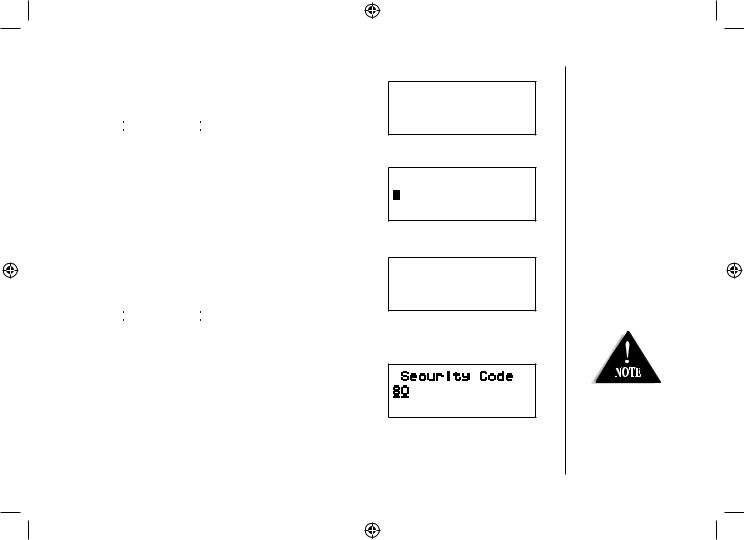
Setting the Anykey Answer
1)Enter the Handset Setup menu, and then the Anykey Answer submenu (see “Entering the Menu” on page 13).
2)Press  /vol/
/vol/ or
or  /vol/
/vol/ to select On or Off.
to select On or Off.
3)Press 
 . You will hear a confirmation tone.
. You will hear a confirmation tone.
Setting the True Banner
1)Enter the Handset Setup menu, and then the Banner submenu (see “Entering the Menu” on page 13).
2)Use the number keypad (0-9), 
 tone
tone ,
, 

 , or
, or  /del to enter or edit the name.
/del to enter or edit the name.
3)Press 
 . You will hear a confirmation tone.
. You will hear a confirmation tone.
Setting the Key Touch Tone
1)Enter the Handset Setup menu, and then the Key Touch Tone submenu (see “Entering the Menu” on page 13).
2)Press  /vol/
/vol/ or
or  /vol/
/vol/ to select On or Off.
to select On or Off.
3)Press 
 . You will hear a confirmation tone.
. You will hear a confirmation tone.
Anykey Answer
On
 Off
Off
Banner
_________ #1
Key Touch Tone
 On
On
Off
Answering System Setup
Setting a PIN Code
1) Enter the Answ. Setup menu, and then the Security Code submenu (see “Entering the Menu” on page 13).
2)Enter a two-digit PIN code (00-99) using the number keypad (0-9).
3)Press 
 . You will hear a confirmation tone.
. You will hear a confirmation tone.
For Answering Setup menu, you can also set them from the base (see page 44).
[ 16 ]
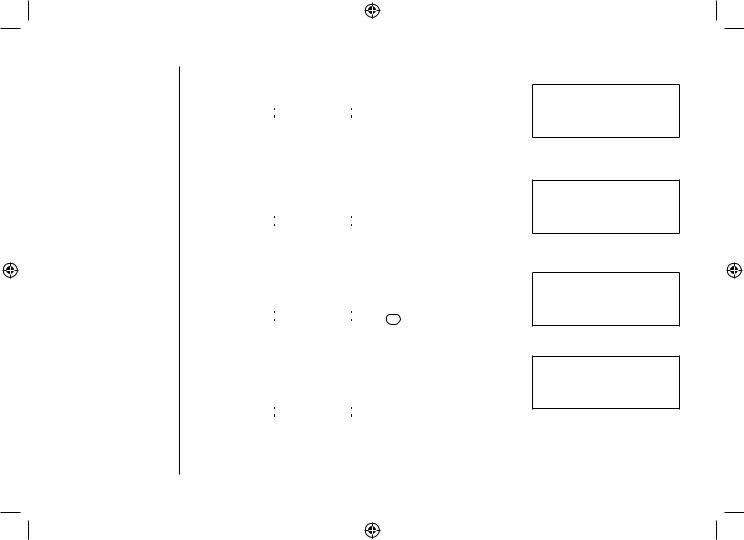
Setting the Ring Time
1)Enter the Answ. Setup menu, and then the Ring Time submenu (see “Entering the Menu” on page 13).
2)Press  /vol/
/vol/ or
or  /vol/
/vol/ to select a Ring Time (Toll Saver, 4 Times, 6 Times, or 9 Times).
to select a Ring Time (Toll Saver, 4 Times, 6 Times, or 9 Times).
3)Press 
 . You will hear a confirmation tone.
. You will hear a confirmation tone.
Setting the Record Time
1)Enter the Answ. Setup menu, and then the Record Time submenu (see “Entering the Menu” on page 13).
2)Press  /vol/
/vol/ or
or  /vol/
/vol/ to select Record Time (1 Minute, 4 Minutes, or Announce Only).
to select Record Time (1 Minute, 4 Minutes, or Announce Only).
3)Press 
 . You will hear a confirmation tone.
. You will hear a confirmation tone.
Setting the Message Alert On or Off
1)Enter the Answ. Setup menu, and then the Message Alert submenu (see “Entering the Menu” on page 13).
2)Press  /vol/
/vol/ or
or  /vol/
/vol/  to select on or off.
to select on or off.
3)Press 
 . You will hear a confirmation tone.
. You will hear a confirmation tone.
Setting the Call Screen
1)Enter the Answ. Setup menu, and then the Call Screen submenu (see “Entering the Menu” on page 13).
2)Press  /vol/
/vol/ or
or  /vol/
/vol/ to select on or off.
to select on or off.
3)Press 
 . You will hear a confirmation tone.
. You will hear a confirmation tone.
Ring Time
 Toll Saver
Toll Saver
4 Times
Record Time
 1 Minute
1 Minute
4 Minutes
Message Alert
On
 Off
Off
Call Screen
 On
On
Off
[ 17 ]
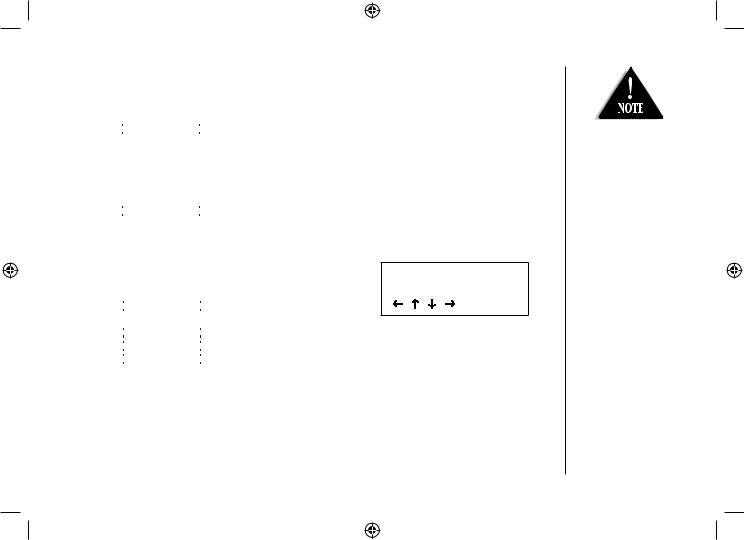
Global Setup
Setting Name Tag (POP ID)
1)Enter the Global Setup menu, and then the Name Tag submenu (see “Entering the Menu” on page 13).
2)Press  /vol/
/vol/ or
or  /vol/
/vol/ to change the selection, On or Off.
to change the selection, On or Off.
3)Press 
 . You will hear a confirmation tone.
. You will hear a confirmation tone.
Setting Insert Zero (New Zealand only)
1)Enter the Global Setup menu, and then the Insert 0 submenu (see “Entering the Menu” on page 13).
2)Press  /vol/
/vol/ or
or  /vol/
/vol/ to change the selection, On or Off.
to change the selection, On or Off.
3)Press 
 . You will hear a confirmation tone.
. You will hear a confirmation tone.
Setting Day and Time
1) Enter the Global Setup menu, and then the Day & Time submenu (see “Entering the Menu” on page 13).
2) Press  /vol/
/vol/ or
or  /vol/
/vol/ to select the day of the week, and then press
to select the day of the week, and then press 
 .
.
3)Press  /vol/
/vol/ or
or  /vol/
/vol/ to set hour and then press
to set hour and then press 
 .
.
4)Press  /vol/
/vol/ or
or  /vol/
/vol/ to set minute and then press
to set minute and then press 
 .
.
5)Press  /vol/
/vol/ or
or  /vol/
/vol/ to choose AM or PM, and then press
to choose AM or PM, and then press 
 . You will hear a confirmation tone.
. You will hear a confirmation tone.
•When a Global setting is changed from one handset, this affects
all registered handsets.
•For setting the Day and Time, the idle time-out is extended to 2 minutes.
[ 18 ]
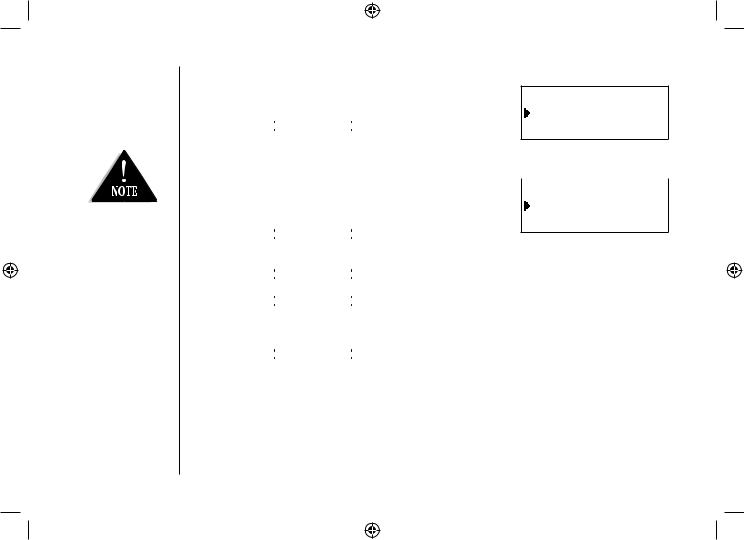
•If you receive a call the transfer will
be canceled.
•If an error occurs, the phonebook locations transferred before the error were stored in the receiving handset.
Unavailable appears on the display.
•When the memory of the receiving handset is full, Not enough memory
in Receiving Handset appears. You cannot transfer the phonebook location.
Setting the Dial Mode (Australia only)
1)Enter the Global Setup menu, and then the Dial Mode submenu (see “Entering the Menu” on page
13).
2)Press  /vol/
/vol/ or
or  /vol/
/vol/ to change the select, Tone or Pulse (the initial setting is Tone).
to change the select, Tone or Pulse (the initial setting is Tone).
3)Press 
 . You will hear a confirmation tone.
. You will hear a confirmation tone.
Dial Mode
Tone
Pulse
Copy Phonebook |
|
|
|
|
Copy |
Phonebook |
|||
1) Enter the Global Setup menu, and then the Copy |
||||
One |
Memory |
|
||
Phonebook submenu (see “Entering the Menu” on |
|
|||
page 13). |
All |
Memory |
:xxx |
|
2)Press  /vol/
/vol/ or
or  /vol/
/vol/ to choose One Memory or All Memory, and then press
to choose One Memory or All Memory, and then press 
 . If you choose All Memory, go to step 4.
. If you choose All Memory, go to step 4.
3)Press  /vol/
/vol/ or
or  /vol/
/vol/ , or the number keypad (2-9 and 0) to select the phonebook location you want to export, and then press
, or the number keypad (2-9 and 0) to select the phonebook location you want to export, and then press 
 .
.
4)Press  /vol/
/vol/ or
or  /vol/
/vol/ to select the handset to which you want transfer the phonebook locations, and then press
to select the handset to which you want transfer the phonebook locations, and then press 
 .
.
If you choose All Memory in the step 2, Are you sure? appears.
Press  /vol/
/vol/ or
or  /vol/
/vol/ to select Yes, and then press
to select Yes, and then press 
 .
.
The phonebook locations will be transferred to the handset. On the receiving handset, Receiving and the handset name appear. When the transfer complete, Done! appears on the handset.
[ 19 ]
